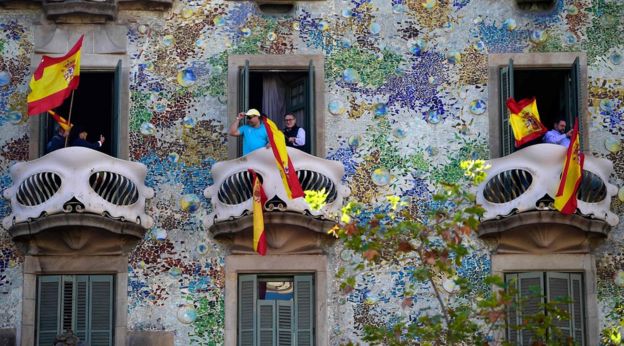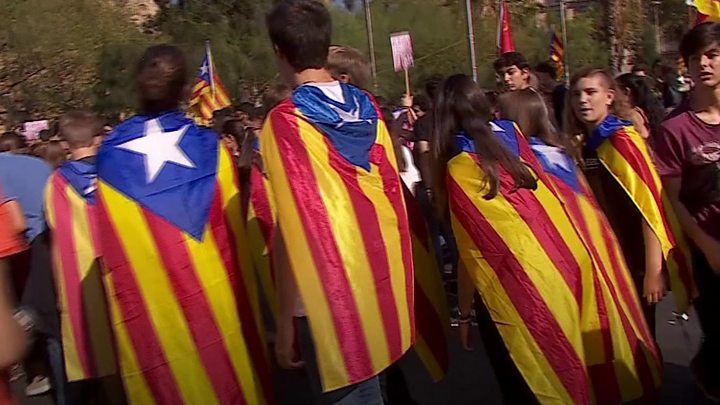Pro-unity protesters gathered for a rally in Catalonia's capital Barcelona on Sunday, two days after regional lawmakers voted to break away from Spain, plunging the country into an unprecedented political crisis.
Pro-independence supporters cheer and wave pro independence flags in Barcelona. AP
As protesters gathered for the march, the deputy president of the region's now-deposed government lashed out against Madrid over what he called a "coup d'etat".
"The president of the country is and will remain Carles Puigdemont," his deputy Oriol Junqueras wrote in Catalan newspaper El Punt Avui.
Junqueras used the word "country" to refer to Catalonia, whose lawmakers pushed Spain into uncharted waters Friday with a vote to declare the region independent.
"We cannot recognise the coup d'etat against Catalonia, nor any of the anti-democratic decisions that the PP (Prime Minister Mariano Rajoy's ruling Popular Party) is adopting by remote control from Madrid," Junqueras wrote.
He signed the article as the "vice president of the government of Catalonia".
The Catalan crisis was triggered by a banned independence referendum on October 1 that was shunned by many, and marred by police violence.
Then on Friday, Catalan lawmakers passed a motion, by 70 votes out of 135 in the secessionist-majority regional parliament, to declare the region of 7.5 million people independent from Spain.
Rajoy responded by deposing the regional government, dissolving its parliament, and calling December 21 elections to replace them.
Deputy prime minister Soraya Saenz de Santamaria, was temporarily put in charge of administering the rebel region.
As prosecutors prepared to file charges of rebellion against Puigdemont next week, he too was defiant on Saturday, calling for "democratic opposition" to Madrid's power grab.
Puigdemont accused the central government of trampling on the will of independence-seeking Catalans with the first curtailment of regional autonomy since Francisco Franco's brutal 1939-75 dictatorship.
Barcelona readied for Sunday's anti-independence march under the slogan: "Catalonia is all of us!"
Television footage showed people streaming out of a metro station near the march, draped in Spanish flags.
The rally is due to kick off at noon near where tens of thousands of people celebrated the new "republic" with song, wine and fireworks just two days earlier.
"Viva Espana!" cried Sunday's protesters, whose chant means "long live Spain".
Participants at the rally will include representatives of three Catalan opposition parties — including Rajoy's conservative PP, in what may amount to the start of an election campaign
Catalonia independence: Huge Barcelona pro-Spain rally
Hundreds of thousands are attending a rally for Spanish unity in Barcelona after Catalonia was stripped of its autonomy for declaring independence.
Many of those protesting in the region's largest city chanted that sacked Catalan leader Carles Puigdemont should be jailed.
Mr Puigdemont was dismissed as Spain's central government took control of Catalan institutions.
On Sunday, a minister in Belgium said he could get political asylum there.
Spain has been gripped by a constitutional crisis since a referendum, organised by Mr Puigdemont's separatist government, was held earlier this month in defiance of a ruling by the Constitutional Court which had declared it illegal.
The Catalan government said that of the 43% of potential voters who took part, 90% were in favour of independence.
The Guardia Urbana, a Catalan municipal police force, said at least 300,000 people had turned out in Barcelona. Organisers and the government in Madrid put the turnout a more than a million people.
Veteran Catalan politician Josep Borrell, a former president of the European Parliament, told demonstrators that Catalonia's former separatist leaders had no right to speak on behalf of the entire region.
Among the demonstrators was Marina Fernandez, a 19-year-old student, who said she was unhappy with the actions taken by the Catalan authorities.
"I am enraged about what they are doing to the country that my grandparents built," she told the AFP news agency.
Another protester, Maria Lopez, told Reuters news agency: "What do we want? That they don't break us up. This is a disgrace. We are not going to consent. They are shameless, shameless, and Mr Puigdemont needs to be taken to prison."
 Image copyrightAFP/GETTY IMAGESImage captionPro-Spain protesters gathered at the Gaudi-designed Casa Batllo in Barcelona
Image copyrightAFP/GETTY IMAGESImage captionPro-Spain protesters gathered at the Gaudi-designed Casa Batllo in Barcelona
'Silenced majority'
Many of them waved Spanish flags and chanted "Viva Espana" and "The streets are for everyone" as they marched through Barcelona in support of Spanish unity and against Catalonia's unilateral declaration of independence.
Catalonia's main opposition party said the region's "silenced majority" was now speaking.
The atmosphere was peaceful, as police helicopters monitored from above.
Several off-duty police officers who had joined the protest told the BBC they felt there was deep division in their ranks, and were worried what could come next if their separatist colleagues refused to take orders from Madrid.
The key issue is what happens to Carles Puigdemont, who is still calling himself the Catalan president - despite having been removed from office by the Spanish government, along with his cabinet and more than 100 officials.
His job, in all but title, has been transferred to Spain's deputy prime minister until elections in December.
Independence supporters are being urged to resist any attempt by Madrid to forcefully remove the separatist leaders.
Friday saw the regional parliament declare independence, with Madrid responding by declaring the move illegal.
Prime Minister Mariano Rajoy then announced the dissolution of the regional parliament and the removal of Mr Puigdemont as Catalan leader, and ordered that fresh regional elections should be held in December.
Mr Puigdemont has urged "democratic opposition" to direct rule from Madrid, which has said it would welcome his participation in the election.
A government spokesman in Madrid, Íñigo Méndez de Vigo, said Mr Puigdemont had the right to continue in politics, despite his removal from office.
"If Puigdemont takes part in these elections, he can exercise this democratic opposition," he said.

Media captionCatalonia: Spanish flags and what they mean
On Sunday, Belgium's Migration Minister Theo Francken told local TV the separatist leader could be given asylum protection which Spain would find difficult to reverse.
"If you see the situation at the moment, the prison sentences and the repression from Madrid and the prison sentences that are bandied about... the question is obviously whether somebody like that has the chance of a fair trial," he told Reuters.
There is no suggestion that Mr Puigdemont is seeking to leave Catalonia.
Later on Sunday, he is expected to attend a football match in Girona, the heartland of the pro-independence movement, when the local team play Real Madrid - who Mr Rajoy supports.
A poll published by Spanish national newspaper El Pais on Saturday suggested a small majority of Catalans (52% to 43%) were in favour of the dissolution of the regional parliament and the holding of elections.
Fifty-five per cent of Catalan respondents opposed the declaration of independence, with 41% in favour.
Before Madrid took over the Catalan government, the region had one of the greatest levels of self-government in Spain.
It has its own parliament, police force and public broadcaster, as well as a government and president, though those have now been dismissed.
Catalans had a range of powers in many policy areas from culture and environment to communications, transportation, commerce and public safety.
Foreign affairs, the armed forces and fiscal policy were always the sole responsibility of the Spanish government.


0 comments: